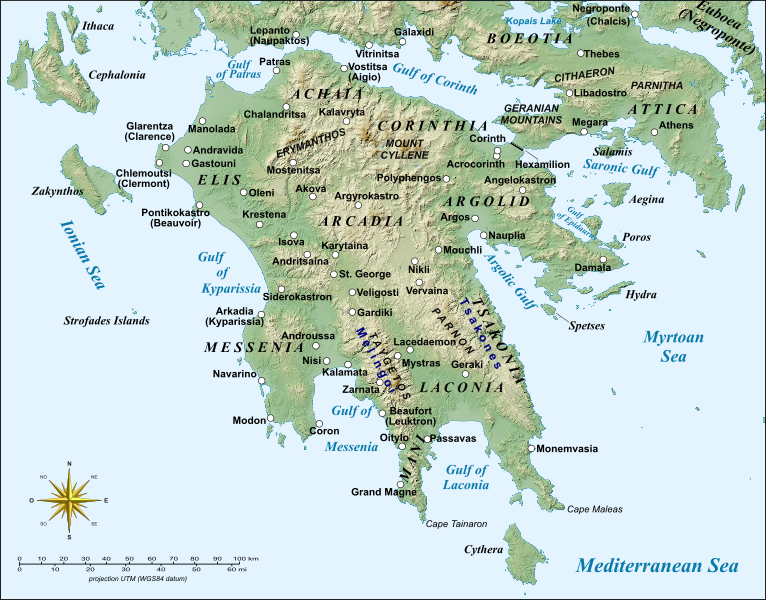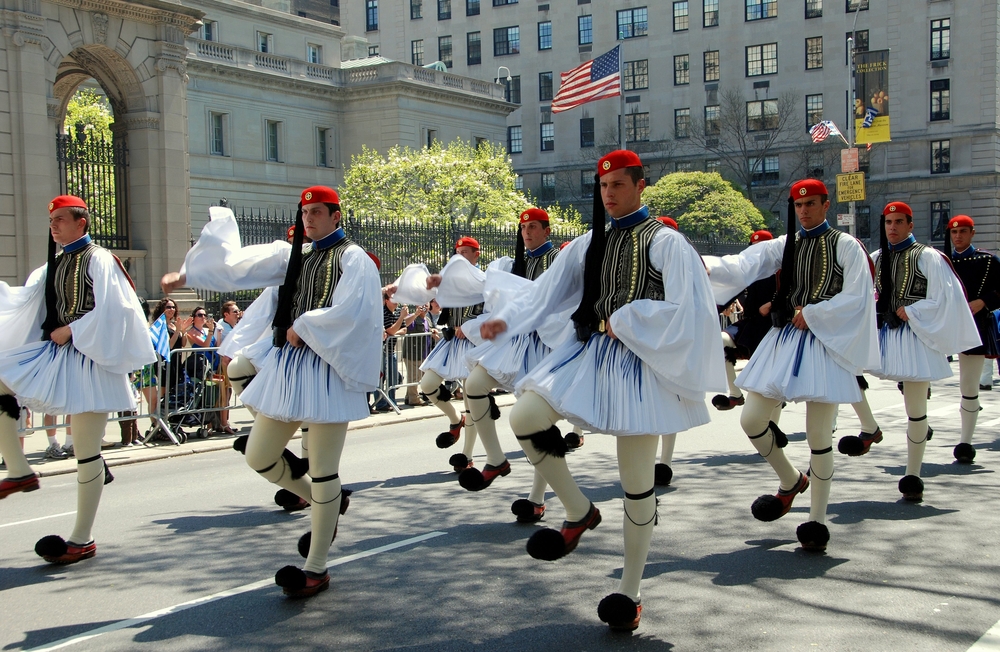On March 25th, Greece celebrates the Greek War of Independence declared on the same date in 1821 against the Ottoman empire. This year, we are commemorating 200 years from that historical date and lots of festivities are taking place both in Greece and abroad. The Greek Revolution, as it is widely known, was the landmark for the creation of the Greek state that we all know today. This is the reason why this celebration is so important to the Greek people.
But let’s take the story from the beginning. Why did the Greeks want to revolt against the Ottoman Empire?
In order to answer this question, we have to go back in 1453. On that year, the Eastern Roman Empire fell to the Ottomans and Greeks would have to live for the next 4 centuries under their rule. The Eastern Roman Empire, – later called Byzantium by Western scholars- was not certainly Greek. It was a Christian multinational empire, however consisted of 3 basic elements: firstly it was based on Greek-Roman law, secondly it had a common Christian orthodox faith and thirdly, its official state language was the Greek from 7th century A.D. Greeks thrived during that period and excelled in many fields such as architecture, sciences, commerce, military and politics. So, from 330 A.D – when the first capital of the Roman Empire was transferred to Constantinople until 1453, a new identity was being forged, the one known as “Romios” named after Rome, the first capital of the Roman Empire. Thus, Greeks had always wanted to get back their previous imperial status and gain their independence from the Ottomans. This is why their revolutionary declarations were especially dedicated to their Christian Faith and freedom.
Undoubtedly, the Ottomans did not try to convert all their subjects into Muslims. There were times when Christians could venerate their God and follow their religion by going to the church as long as they were peaceful and paid their heavy taxes to the Sultan. However, this wasn’t always the case. In periods of political turmoil, Christians used to lose their religious freedom and many of them lost their lives when they refused to denounce their Christian faith and follow Islam. This is the wave of “neomartyrs – witnesses for Christ”, people who died for the love of Christ. At this point, we have to highlight the contribution of the Orthodox Christian Church to the continuity of the Greek language and safeguard of the Greek identity.
Not only was the religious suppression a worthy cause for the Greeks to revolt but economic reasons too. By the 18th and early 19th century, a new bourgeoisie had already been created and many Greeks had become successful merchants and ship owners. The Ottoman Empire did not try to integrate these people into the imperial economy or protect them from its feudal system in periods of economic crises. This Greek upper class travelled to Europe and managed to get a decent education which spread the ideas of Enlightnement to the rest of the Greeks.
Despite numerous previous attempts of Greeks to declare war and revolt against the Ottomans, they weren’t crowned with success. The revolution of 1821 was successful especially because of its timing and coordination. This coordination is due to the secret organization known as “filiki etairia” – Friendly Society- . Filiki Etairia was founded in Odessa, Ukraine in 1814 by Greek merchants such as Nikolaos Skoufas, Athanasios Tsakalof and Emmanouil Xanthos. Its main mission was the collaboration of all parties that could contribute to the outbreak of an armed Revolution against the Ottomans aiming at the Greek independence. For this purpose they established a network of people that included wealthy merchants, ship owners, teachers, politicians, warlords and others.
The revolution broke out with the proclamation of Alexandros Ipsilantis at the Danubian principalities on February 24th 1821. Ipsilantis was an officer of the Russian army at the time and the leader of “Filiki Etairia”. He crossed the river Prut and set up a military camp at Iasi in Moldavia. His well-known proclamation “Fight for your faith and for your homeland” was the spark that in just a few weeks would light a fire. His choice of Moldavia and Wallachia was not incidental. He tried to draw Russia into this revolutionary attempt but unfortunately this didn’t happen.
Great Greek victories would follow after the oath of the Greek warlords for freedom at Agia Lavra’s monastery in Kalavryta on 21st of March 1821. The liberation of Kalamata on March 23rd set the Greek hearts on fire. The Metropolitan of the city of Patras Germanos, raised the banner of Revolution. According to a national legend, it is said that the Revolution was declared on March 25th at Agia Lavra Monastery in Kalavryta but the historical truth is that this happened a few days later in Patras. Regardless of the exact day of the Revolution’s declaration, the Greeks were determined either to gain their freedom or die. The official commemoration of the Greek Independence day, on March 25th, was established by the king of Greece Otto in 1838, as an effort to identify the outbreak of the Greek Revolution with the religious celebration of the Annunciation “Evangelismos’’. This was in line though with the consciousness of the Greek people and Filiki’s Etairias members at the time.
The liberation of Tripolitsa, by Theodoros Kolokotronis, followed in September 1821 and signified one of the most important victories since the fortress of Tripolitsa –today’s Tripoli- was the center of the Ottoman power in the Peloponnese.

Map of the Peloponnese
On January 1st 1822, Greeks had their first Constitution voted in Epidavros during the first National Assembly.
Greek revolts spread like wildfire all over Greece and great heroes emerged one after the other. Athanasios Diakos had liberated Livadia, Thebes and Atalanta by the time he was captured in the battle of Alamana and gave his life deliberately as he refused to denounce his orthodox Christian faith. His penalty was death by impalement. Another great Greek hero was Georgios Karaiskakis who gave great battles in Roumeli. At Arachova battle in November 1826, he saved Central Greece from an Ottoman recapture. He was considered to be one of the most popular Generals among the warlords of his time.
The next great success for the Greeks was at sea in June 1822. Constantine Kanaris destroyed the Turkish flagship of the Turkish admiral Kara Ali Pascha who was responsible for the Chios massacre. 2000 Turks died that night including Kara Ali. Additionally, the battle of Dervenakia was another important Greek victory where significant forces of General Mahmut Pasha Dramalis were destroyed in July 1822 next to Corinth.
Unfortunately, the delirium of victories was to come to an end because of 2 civil wars that made the Greeks suffer from 1823 to 1825. Among of the causes for these civil wars were the handling of the money from the first loans that Greeks had managed to get from Great Britain and the influence of power between the warlords and the politicians. The revolutionaries hadn’t stopped fighting each other when the Egyptian Ibrahim came to the Peloponnese in February 1825. Greeks were divided and the battle of Maniaki was lost under the rule of Papaflesas who fought and fell heroically in May 1825. Hopefully the forces of Captain Yiannis Makriyiannis and Demetrios Ipsilantis at Lerna Mills battle in Argos, managed to repulse the Egyptians and saved the city of Nafplion where was the seat of the Greek government in June 1825.
Nevertheless, things started to change for the Greeks because of several reasons. Firstly, 7 years of Greek resistance and bloodshed had touched the European public opinion. Events such as the heroic exodus and fall of Messolonghi in April 1826 and the Chios or Psara massacre had created a philhellenic movement. Additionally the new government in Great Britain under George Cunning in 1827 was very supportive of the Greek independence. Ioannis Kappodistria’s previous efforts as former Foreign Affairs Tsar’s minister made the Great Powers understand that it was in their interest to help the Greek State to be born at the time of fall of the Ottoman Empire.
Thus, this is how we came to Navarino battleship in April 1827. The naval forces of Great Britain, France and Russia destroyed the Ottoman navy due to an accidental event. This was the beginning of the Independence.
In 1828, Russia declared war to the Ottoman Empire and had already proposed a plan for a Greek autonomy. Great Britain trying to repulse a Russian influence in Balkans, proposed the Independence and the foundation of a Greek nation-state. Eventually, Kapodistrias signed the London Protocol of Independence on February 3rd 1830. Ioannis Kapodistrias was to be the first Governor of Greece.
There is a great debate whether the Greek nation-state satisfied the desires of the people who fought for the Greek Independence. There were people such as Rigas Feraios and Alexander Ipsilantis that had dreamt of a Christian multinational Empire which would use the Greek language as its official language reflecting the Byzantine heritage. Others, like Adamantios Korais and Alexander Mavrokordatos were supporters of a nation-state according to the European ideals. It seems that the second group of people prevailed within the revolutionaries and Filiki Etairia – Friendy Society.
In any case, we have to pay tribute to the people who fought and fell for the Greek Independence and we shall be proud of them. We have the blessing to have our own country and this is not a small thing.
Long live Greece!
Our greetings and best wishes to all the Greeks around the world!
